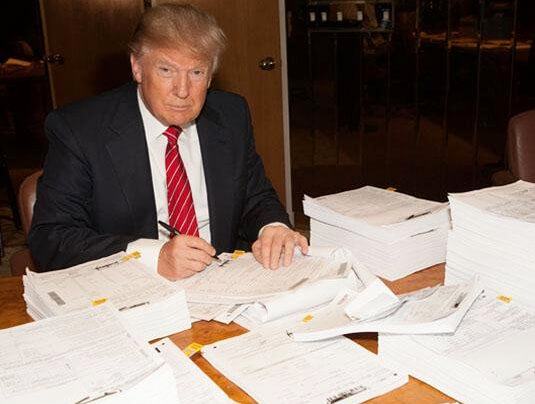State Gaming Regulators Viewed Donald Trump Tax Returns, But Mum’s the Word
Posted on: September 29, 2016, 11:08h.
Last updated on: September 29, 2016, 12:00h.
Donald Trump’s tax returns have become a key talking point in the 2016 presidential election. They’re almost as talked-about as Hillary Clinton’s health issues and email scandals.

And with less than 40 days until Americans head to the polls to choose their next president, many would like to see what kind of tax rate Trump has been paying on his business revenues, and just how charitable the billionaire truly is.
To date, the general public has been barred from viewing the filings, which likely run well over a thousand pages of fascinating IRS gibberish. But it now turns out that besides the auditors who Trump repeatedly blames for his secrecy, quite a few state gaming regulators have been privy to the financial version of “War and Peace.”
Trump, of course, once owned casinos in New Jersey, Indiana, and California, during his two decades in the gaming business. The GOP nominee also tried to gain casino permits in Pennsylvania, Nevada, Michigan, and Missouri.
In that process, all of those states’ regulators got to see Trump’s financial returns. Gaming agencies typically require applicants to document their financial status before handing out any licenses.
While various states’ gaming commissions have different application protocols and procedures, one thing they all have in common is that they cannot publicly share the received confidential information, so don’t expect any spilled information on this front.
Money Information Management
The Republican Party candidate for the Oval Office has campaigned on his business record that has made him a billionaire, but Trump’s continued refusal to make his tax returns public has been scorned by his opponent.
During the first debate, Democratic nominee Hillary Clinton challenged Trump on his financial secretiveness.
“There is something he is hiding,” the former secretary of state claimed. “Maybe he doesn’t want the American people . . . to know that he’s paid nothing in federal taxes, because the only years that anybody’s ever seen were a couple of years when he had to turn them over to state authorities when he was trying to get a casino license, and they showed he didn’t pay any federal income tax.”
“That makes me smart,” Trump rebutted.
But immediately following the debate, the Republican candidate told reporters, “Of course I’ve paid federal taxes,” a remark that seemingly contradicted what he said an hour earlier.
Trump’s tax controversy becoming a center topic in the presidential election plays directly into Clinton’s hand. Instead of discussing her controversial decisions as secretary of state in regards to Benghazi and the subsequent rise of ISIS, Clinton has managed to move the conversation towards Trump and away from her own red herrings.
‘Tax Returns for Emails’ Swap
Trump has claimed that an ongoing IRS audit prevents him from releasing his returns, though some tax experts have said that isn’t factual. He’s also said that his attorneys have advised him against publicizing the records.
However, the Republican says he is willing to release the returns, even now against advice of counsel, but only on the condition that Clinton produces the 33,000 emails she is said to have deleted from her private email server. Clinton claims the emails were not work-related, but the FBI later discovered that classified information was stored on the non-government server.
FBI Director James Comey recommended to US Attorney Loretta Lynch that criminal charges not be brought against Mrs. Clinton, and none were.
Anti-online gambling proponent Rep. Jason Chaffetz (R-Utah) has been on a crusade to learn more about Clinton’s emails, however. The Restoration of America’s Wire Act (RAWA) author has subpoenaed IT employees who worked on the server.
But adding to the controversy, this week the FBI granted immunity to five Clinton aides, a move that Chaffetz called out in a televised tirade.
No comments yet